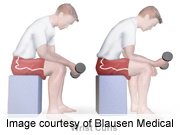
WEDNESDAY, Feb. 1 (HealthDay News) — Exercise can improve the health, energy and well-being of cancer patients after they’ve completed their main cancer treatment, a new review finds.
University of Hong Kong researchers analyzed the results of 34 clinical trials that examined the effects of physical activity among adult patients with breast, prostate, gynecologic, colorectal, gastric or lung cancer.
The study was published online Feb. 1 in BMJ.
There were an average of 93 patients in each trial, which included aerobic, resistance and strength training. The patients’ average age was 55, and the training lasted roughly 13 weeks.
Breast cancer patients showed improvements in blood sugar control, body mass index (BMI) and body weight, physical functions such as lower limb strength, mental health problems such as fatigue and depression, and quality of life.
Patients with other types of cancer who were physically active experienced improvements in BMI and body weight, physical function such as oxygen consumption and hand-grip strength, depression and quality of life.
Different types and levels of exercise had specific effects. For example, breast cancer patients found that aerobic exercise plus resistance was much more effective on physical fitness, emotional fitness, overall well-being and fears about breast cancer than aerobic activity alone.
The researchers also found that younger patients seemed to gain more benefit from exercise, but said this finding was not entirely conclusive because younger patients could exercise for longer periods of time.
The findings show that “quality of life was a clear significant benefit of physical activity and that clinically, there were important positive effects on physical functions and quality of life,” the researchers concluded in a journal news release.
More information
The U.S. National Cancer Institute has more about cancer survivorship.

